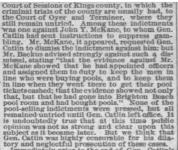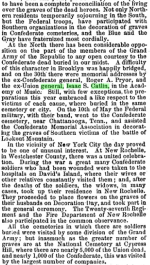"Gambling laws" have constantly been used to target businesses unfairly.
From The Brooklyn Daily Standard Union 1887.
Pool gambling is a social order, why is it a crime? In 1887 the writer concludes that legal mechanism was used in poor taste.

From The Brooklyn Daily Standard Union 1887.
Among these indictments was one against John. Y McKane, to whom Gen Catlin had sent instructions to suppress gambling. Mr McKane, it appeared, requested Gen Catlin to dismiss the indictment against him: but Mr Backus advised strongly against such a dismissal stating that the evidence against Mr McKane showed that he had appointed officers and assigned them to duty to keep them in line when they went there to get their pool tickets cashed; that the evidence showed now only that, but that he had gone into Brighton Beach pool room and had bought pools." None of the pool selling indictments were pressed, but all remained-untried until Gen Catlin left office.
Pool gambling is a social order, why is it a crime? In 1887 the writer concludes that legal mechanism was used in poor taste.



